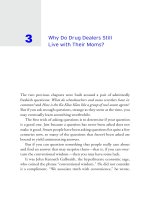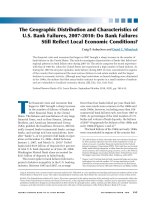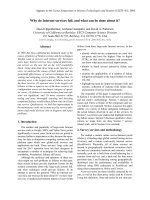Why Do Drug Dealers Still Live with Their Moms
Bạn đang xem bản rút gọn của tài liệu. Xem và tải ngay bản đầy đủ của tài liệu tại đây (1.29 MB, 26 trang )
3
Why Do Drug Dealers Still
Live with Their Moms?
The two previous chapters were built around a pair of admittedly
freakish questions: What do schoolteachers and sumo wrestlers have in
common? and How is the Ku Klux Klan like a group of real-estate agents?
But if you ask enough questions, strange as they seem at the time, you
may eventually learn something worthwhile.
The first trick of asking questions is to determine if your question
is a good one. Just because a question has never been asked does not
make it good. Smart people have been asking questions for quite a few
centuries now, so many of the questions that haven’t been asked are
bound to yield uninteresting answers.
But if you can question something that people really care about
and find an answer that may surprise them—that is, if you can over-
turn the conventional wisdom—then you may have some luck.
It was John Kenneth Galbraith, the hyperliterate economic sage,
who coined the phrase “conventional wisdom.” He did not consider
it a compliment. “We associate truth with convenience,” he wrote,
FREAKONOMICS
“with what most closely accords with self-interest and personal
well-being or promises best to avoid awkward effort or unwelcome
dislocation of life. We also find highly acceptable what contributes
most to self-esteem.” Economic and social behaviors, Galbraith con-
tinued, “are complex, and to comprehend their character is mentally
tiring. Therefore we adhere, as though to a raft, to those ideas which
represent our understanding.”
So the conventional wisdom in Galbraith’s view must be simple,
convenient, comfortable, and comforting—though not necessarily
true. It would be silly to argue that the conventional wisdom is never
true. But noticing where the conventional wisdom may be false—
noticing, perhaps, the contrails of sloppy or self-interested thinking—
is a nice place to start asking questions.
Consider the recent history of homelessness in the United States.
In the early 1980s, an advocate for the homeless named Mitch Snyder
took to saying that there were about 3 million homeless Americans.
The public duly sat up and took notice. More than 1 of every 100
people were homeless? That sure seemed high, but...well, the ex-
pert said it. A heretofore quiescent problem was suddenly catapulted
into the national consciousness. Snyder even testified before Congress
about the magnitude of the problem. He also reportedly told a college
audience that 45 homeless people die each second—which would
mean a whopping 1.4 billion dead homeless every year. (The U.S.
population at the time was about 225 million.) Assuming that Snyder
misspoke or was misquoted and meant to say that one homeless per-
son died every forty-five seconds, that’s still 701,000 dead homeless
people every year—roughly one-third of all deaths in the United
States. Hmm. Ultimately, when Snyder was pressed on his figure of 3
million homeless, he admitted that it was a fabrication. Journalists
had been hounding him for a specific number, he said, and he hadn’t
wanted them to walk away empty-handed.
80
Drug Dealers Living with Their Moms
It may be sad but not surprising to learn that experts like Snyder
can be self-interested to the point of deceit. But they cannot deceive
on their own. Journalists need experts as badly as experts need jour-
nalists. Every day there are newspaper pages and television newscasts
to be filled, and an expert who can deliver a jarring piece of wisdom is
always welcome. Working together, journalists and experts are the
architects of much conventional wisdom.
Advertising too is a brilliant tool for creating conventional wis-
dom. Listerine, for instance, was invented in the nineteenth century
as a powerful surgical antiseptic. It was later sold, in distilled form, as
a floor cleaner and a cure for gonorrhea. But it wasn’t a runaway suc-
cess until the 1920s, when it was pitched as a solution for “chronic
halitosis”—a then obscure medical term for bad breath. Listerine’s
new ads featured forlorn young women and men, eager for marriage
but turned off by their mate’s rotten breath. “Can I be happy with
him in spite of that?” one maiden asked herself. Until that time, bad
breath was not conventionally considered such a catastrophe. But Lis-
terine changed that. As the advertising scholar James B. Twitchell
writes, “Listerine did not make mouthwash as much as it made hali-
tosis.” In just seven years, the company’s revenues rose from $115,000
to more than $8 million.
However created, the conventional wisdom can be hard to budge.
The economist Paul Krugman, a New York Times columnist and de-
vout critic of George W. Bush, bemoaned this fact as the President’s
reelection campaign got under way in early 2004: “The approved
story line about Mr. Bush is that he’s a bluff, honest, plainspoken guy,
and anecdotes that fit that story get reported. But if the conventional
wisdom were instead that he’s a phony, a silver-spoon baby who pre-
tends to be a cowboy, journalists would have plenty of material to
work with.”
In the months leading up to the U.S. invasion of Iraq in 2003,
81
FREAKONOMICS
dueling experts floated diametrically opposite forecasts about Iraq’s
weapons of mass destruction. But more often, as with Mitch Snyder’s
homeless “statistics,” one side wins the war of conventional wisdom.
Women’s rights advocates, for instance, have hyped the incidence of
sexual assault, claiming that one in three American women will in her
lifetime be a victim of rape or attempted rape. (The actual figure is
more like one in eight—but the advocates know it would take a
callous person to publicly dispute their claims.) Advocates working
for the cures of various tragic diseases regularly do the same. Why not?
A little creative lying can draw attention, indignation, and—perhaps
most important—the money and political capital to address the ac-
tual problem.
Of course an expert, whether a women’s health advocate or a polit-
ical advisor or an advertising executive, tends to have different incen-
tives than the rest of us. And an expert’s incentives may shift 180
degrees, depending on the situation.
Consider the police. A recent audit discovered that the police in
Atlanta were radically underreporting crime since the early 1990s.
The practice apparently began when Atlanta was working to land the
1996 Olympics. The city needed to shed its violent image, and fast.
So each year thousands of crime reports were either downgraded from
violent to nonviolent or simply thrown away. (Despite these continu-
ing efforts—there were more than 22,000 missing police reports in
2002 alone—Atlanta regularly ranks among the most violent Ameri-
can cities.)
Police in other cities, meanwhile, were spinning a different story
during the 1990s. The sudden, violent appearance of crack cocaine
had police departments across the country scrapping for resources.
They made it known that it wasn’t a fair fight: the drug dealers were
armed with state-of-the-art weapons and a bottomless supply of
cash. This emphasis on illicit cash proved to be a winning effort, for
82
Drug Dealers Living with Their Moms
nothing infuriated the law-abiding populace more than the image of
the millionaire crack dealer. The media eagerly glommed on to this
story, portraying crack dealing as one of the most profitable jobs in
America.
But if you were to have spent a little time around the housing proj-
ects where crack was so often sold, you might have noticed something
strange: not only did most of the crack dealers still live in the projects,
but most of them still lived at home with their moms. And then you
may have scratched your head and said, “Why is that?”
The answer lies in finding the right data, and the secret to finding
the right data usually means finding the right person—which is more
easily said than done. Drug dealers are rarely trained in economics,
and economists rarely hang out with crack dealers. So the answer to
this question begins with finding someone who did live among the
drug dealers and managed to walk away with the secrets of their trade.
Sudhir Venkatesh—his boyhood friends called him Sid, but he has
since reverted to Sudhir—was born in India, raised in the suburbs of
upstate New York and southern California, and graduated from the
University of California at San Diego with a degree in mathematics.
In 1989 he began to pursue his PhD in sociology at the University of
Chicago. He was interested in understanding how young people form
their identities; to that end, he had just spent three months following
the Grateful Dead around the country. What he was not interested in
was the grueling fieldwork that typifies sociology.
But his graduate advisor, the eminent poverty scholar William
Julius Wilson, promptly sent Venkatesh into the field. His assign-
ment: to visit Chicago’s poorest black neighborhoods with a clipboard
and a seventy-question, multiple-choice survey. This was the first
question on the survey:
83
FREAKONOMICS
How do you feel about being black and poor?
a. Very bad
b. Bad
c. Neither bad nor good
d. Somewhat good
e. Very good
One day Venkatesh walked twenty blocks from the university to
a housing project on the shore of Lake Michigan to administer his
survey. The project comprised three sixteen-story buildings made of
yellow-gray brick. Venkatesh soon discovered that the names and ad-
dresses he had been given were badly outdated. These buildings were
condemned, practically abandoned. Some families lived on the lower
floors, pirating water and electricity, but the elevators didn’t work.
Neither did the lights in the stairwell. It was late afternoon in early
winter, nearly dark outside.
Venkatesh, who is a thoughtful, handsome, and well-built but not
aberrationally brave person, had made his way up to the sixth floor,
trying to find someone willing to take his survey. Suddenly, on the
stairwell landing, he startled a group of teenagers shooting dice. They
turned out to be a gang of junior-level crack dealers who operated out
of the building, and they were not happy to see him.
“I’m a student at the University of Chicago,” Venkatesh sputtered,
sticking to his survey script, “and I am administering—”
“Fuck you, nigger, what are you doing in our stairwell?”
There was an ongoing gang war in Chicago. Things had been vio-
lent lately, with shootings nearly every day. This gang, a branch of
the Black Gangster Disciple Nation, was plainly on edge. They didn’t
know what to make of Venkatesh. He didn’t seem to be a member of a
rival gang. But maybe he was some kind of spy? He certainly wasn’t a
84
Drug Dealers Living with Their Moms
cop. He wasn’t black, wasn’t white. He wasn’t exactly threatening—he
was armed only with his clipboard—but he didn’t seem quite harm-
less either. Thanks to his three months trailing the Grateful Dead, he
still looked, as he would later put it, “like a genuine freak, with hair
down to my ass.”
The gang members started arguing over what should be done with
Venkatesh. Let him go? But if he did tell the rival gang about this
stairwell hangout, they’d be susceptible to a surprise attack. One
jittery kid kept wagging something back and forth in his hands—in
the dimming light, Venkatesh eventually realized it was a gun—and
muttering, “Let me have him, let me have him.” Venkatesh was very,
very scared.
The crowd grew bigger and louder. Then an older gang member
appeared. He snatched the clipboard from Venkatesh’s hands and,
when he saw that it was a written questionnaire, looked puzzled.
“I can’t read any of this shit,” he said.
“That’s because you can’t read,” said one of the teenagers, and
everyone laughed at the older gangster.
He told Venkatesh to go ahead and ask him a question from the
survey. Venkatesh led with the how-does-it-feel-to-be-black-and-
poor question. It was met with a round of guffaws, some angrier than
others. As Venkatesh would later tell his university colleagues, he real-
ized that the multiple-choice answers A through E were insufficient.
In reality, he now knew, the answers should have looked like this:
a. Very bad
b. Bad
c. Neither bad nor good
d. Somewhat good
e. Very good
f. Fuck you
85
FREAKONOMICS
Just as things were looking their bleakest for Venkatesh, another
man appeared. This was J. T., the gang’s leader. J. T. wanted to know
what was going on. Then he told Venkatesh to read him the survey
question. He listened but then said he couldn’t answer the question
because he wasn’t black.
“Well then,” Venkatesh said, “how does it feel to be African Amer-
ican and poor?”
“I ain’t no African American either, you idiot. I’m a nigger.” J. T.
then administered a lively though not unfriendly taxonomical lesson
in “nigger” versus “African American” versus “black.” When he was
through, there was an awkward silence. Still nobody seemed to know
what to do with Venkatesh. J. T., who was in his late twenties, had
cooled down his subordinates, but he didn’t seem to want to interfere
directly with their catch. Darkness fell and J. T. left. “People don’t
come out of here alive,” the jittery teenager with the gun told
Venkatesh. “You know that, don’t you?”
As night deepened, his captors eased up. They gave Venkatesh one
of their beers, and then another and another. When he had to pee, he
went where they went—on the stairwell landing one floor up. J. T.
stopped by a few times during the night but didn’t have much to say.
Daybreak came and then noon. Venkatesh would occasionally try to
discuss his survey, but the young crack dealers just laughed and told
him how stupid his questions were. Finally, nearly twenty-four hours
after Venkatesh stumbled upon them, they set him free.
He went home and took a shower. He was relieved but he was also
curious. It struck Venkatesh that most people, including himself, had
never given much thought to the daily life of ghetto criminals. He
was now eager to learn how the Black Disciples worked, from top to
bottom.
After a few hours, he decided to walk back to the housing project.
By now he had thought of some better questions to ask.
86
Drug Dealers Living with Their Moms
Having seen firsthand that the conventional method of data
gathering was in this case absurd, Venkatesh vowed to scrap his ques-
tionnaire and embed himself with the gang. He tracked down J. T.
and sketched out his proposal. J. T. thought Venkatesh was crazy,
literally—a university student wanting to cozy up to a crack gang?
But he also admired what Venkatesh was after. As it happened, J. T.
was a college graduate himself, a business major. After college, he had
taken a job in the Loop, working in the marketing department of a
company that sold office equipment. But he felt so out of place
there—like a white man working at Afro Sheen headquarters, he liked
to say—that he quit. Still, he never forgot what he learned. He knew
the importance of collecting data and finding new markets; he was al-
ways on the lookout for better management strategies. It was no coin-
cidence, in other words, that J. T. was the leader of this crack gang. He
was bred to be a boss.
After some wrangling, J. T. promised Venkatesh unfettered access
to the gang’s operations as long as J. T. retained veto power over any
information that, if published, might prove harmful.
When the yellow-gray buildings on the lakefront were demol-
ished, shortly after Venkatesh’s first visit, the gang relocated to an-
other housing project even deeper in Chicago’s south side. For the
next six years, Venkatesh practically lived there. Under J. T.’s protec-
tion he watched the gang members up close, at work and at home. He
asked endless questions. Sometimes the gangsters were annoyed by
his curiosity; more often they took advantage of his willingness to lis-
ten. “It’s a war out here, man,” one dealer told him. “I mean, every
day people struggling to survive, so you know, we just do what we
can. We ain’t got no choice, and if that means getting killed, well, shit,
it’s what niggers do around here to feed their family.”
Venkatesh would move from one family to the next, washing their
dinner dishes and sleeping on the floor. He bought toys for their
87
FREAKONOMICS
children; he once watched a woman use her baby’s bib to sop up the
blood of a teenaged drug dealer who was shot to death in front of
Venkatesh. William Julius Wilson, back at the U. of C., was having
regular nightmares on Venkatesh’s behalf.
Over the years the gang endured bloody turf wars and, eventually,
a federal indictment. A member named Booty, who was one rank be-
neath J. T., came to Venkatesh with a story. Booty was being blamed
by the rest of the gang for bringing about the indictment, he told
Venkatesh, and therefore suspected that he would soon be killed. (He
was right.) But first Booty wanted to do a little atoning. For all the
gang’s talk about how crack dealing didn’t do any harm—they even
liked to brag that it kept black money in the black community—
Booty was feeling guilty. He wanted to leave behind something that
might somehow benefit the next generation. He handed Venkatesh a
stack of well-worn spiral notebooks—blue and black, the gang’s col-
ors. They represented a complete record of four years’ worth of the
gang’s financial transactions. At J. T.’s direction, the ledgers had been
rigorously compiled: sales, wages, dues, even the death benefits paid
out to the families of murdered members.
At first Venkatesh didn’t even want the notebooks. What if the
Feds found out he had them—perhaps he’d be indicted too? Besides,
what was he supposed to do with the data? Despite his math back-
ground, he had long ago stopped thinking in numbers.
Upon completing his graduate work at the University of Chicago,
Venkatesh was awarded a three-year stay at Harvard’s Society of Fel-
lows. Its environment of sharp thinking and bonhomie—the walnut
paneling, the sherry cart once owned by Oliver Wendell Holmes—
delighted Venkatesh. He went so far as to become the society’s wine
steward. And yet he regularly left Cambridge, returning again and
again to the crack gang in Chicago. This street-level research made
88









